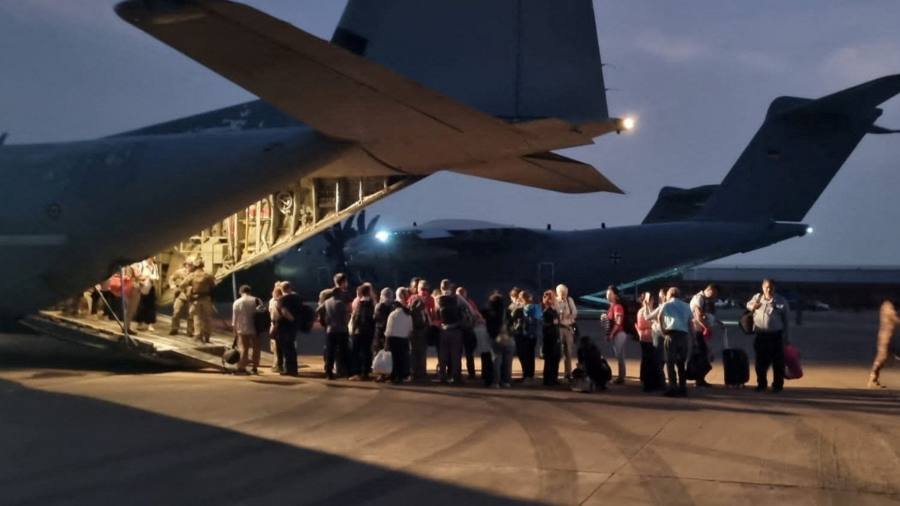
Sudan’s armed forces and the paramilitary Rapid Support Forces have agreed a 72-hour ceasefire following what US secretary of state Antony Blinken described as “intense negotiations” amid deadly clashes in the country.
Blinken said on Monday that the US would press efforts to implement a permanent halt to the fighting. But it was unclear whether the pause would hold. The Sudanese army had previously announced a ceasefire to coincide with Eid holiday marking the end of Ramadan on Friday, but heavy fighting continued around the capital.
More than 400 people have died, mostly in the capital Khartoum, after fighting erupted 10 days ago between the Sudanese armed forces, led by de facto president Abdel Fattah al-Burhan, and forces commanded by his opponent, Mohamed Hamdan Dagalo. Known as Hemeti, Dagalo is Sudan’s vice-president and commander of the Rapid Support Forces.
The US and UK evacuated diplomats over the weekend while other countries such as France and Germany also rescued some civilians.
UK forces were on Monday scoping their potential evacuation options for remaining citizens as ministers came under pressure to do more to rescue the more than 4,000 British passport holders who remain trapped.
Defence insiders said a British team had landed with reconnaissance staff in Port Sudan to provide prime minister Rishi Sunak with options to rescue UK nationals. HMS Lancaster, a British frigate, was offshore in the Red Sea in case needed, they said.
Sunak chaired a meeting of the government’s Cobra emergency committee on Monday — the seventh such meeting — in a sign of his determination to show he has a grip on the situation.
Concern over the UK’s response mounted after it emerged that the British ambassador Giles Lever and his deputy were both on leave when fighting broke out in Khartoum. When hostilities started, Lever resumed work in London.
“He was on approved leave as all staff are entitled to do,” said one government insider. “His next senior official — in this case the development director — was in post covering for him.”
With other countries already flying civilians out of Sudan in their hundreds, pressure was growing on the government to explain why UK diplomats had been evacuated, but not other UK nationals.
Alicia Kearns, Tory chair of the House of Commons foreign affairs select committee, said in a Commons debate that the ability of UK citizens to trust that their country would “get them to a place of safety” was being “stretched”.
Over the weekend, roughly 1,200 UK military personnel rescued UK diplomatic staff and their families from Khartoum in an operation that armed forces minister James Heappey said had gone “without a hitch”.
But Lyn Brown, shadow Africa minister, said the repatriation by other countries of large numbers of non-diplomat citizens “raised serious questions”.
She pointed to France and Germany’s rescue of 700 citizens each, adding that Indonesia had brought out 500; Jordan, 350; Saudi Arabia and Italy, 150 each; and Spain, 100.
The Commons debate heard that 400 holders of UK-only nationality could be in Sudan and another 4,000 holders of joint UK and Sudanese nationality. Of the two groups, some 2,000 have so far registered with the UK authorities to seek potential evacuation.
Africa minister Andrew Mitchell defended the government’s “special duty to diplomats”, but said it was looking at “every conceivable option” to repatriate British nationals and would “do every single thing” it could to help.
However, Azhar Sholgami, a US-based Sudanese researcher, whose British-Sudanese grandparents are trapped in Khartoum, said it was “very, very frustrating” that some lives were being “prioritised over others”, referring to the evacuation of diplomats before non-diplomats.
Residents in Khartoum have said the city is being subjected to air raids and heavy artillery gunfire. Some say they have also been victims of looting by the RSF — something the paramilitary force has denied in a statement.
The US has also so far been unable to rescue anyone other than its embassy staff from Sudan. Blinken said on Monday that “dozens” of the roughly 16,000 US citizens in country had expressed interest in being rescued. He said most are dual nationals.
“We are looking to see how we can help them to ensure their own safety,” he said.